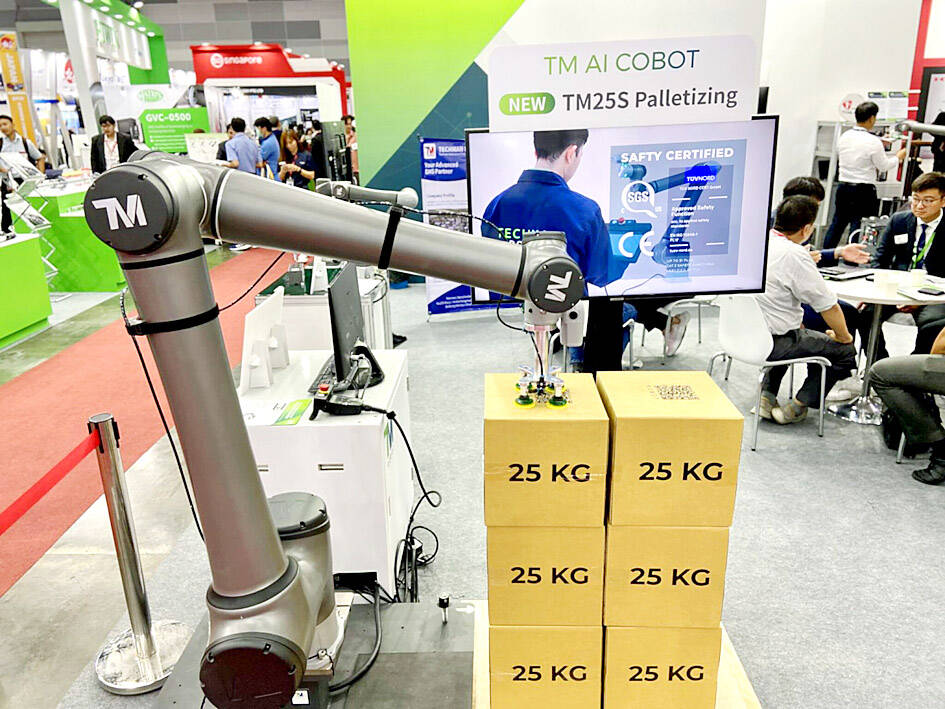The industrial production index in January increased 15.98 percent year-on-year, the Ministry of Economic Affairs reported yesterday, ending 19 months of consecutive declines.
Industrial production measures the change in the value of output produced by manufacturers, utilities and mines.
The ministry attributed the increase to improvements in manufacturing, mining, and electricity and gas supply output, coupled with a less serious deterioration in water supply output.

Photo courtesy of Techman Robot Inc
Manufacturing output, which accounted for 95.41 percent of the index, rose 16.63 percent annually in January, also ending a 19-month downtrend, the report said.
Output received a lift from robust demand for artificial intelligence (AI) applications, high-performance computing (HPC) and cloud data services, as well as the effect of firms stocking up ahead of the Lunar New Year holiday, it said.
However, the better-than-expected readings for industrial and manufacturing output were in part due to a lower comparison base, as the Lunar New Year holiday fell in January last year, which reduced the number of working days then, it said.
The ministry remains optimistic about a steady recovery in industrial and manufacturing output this year, thanks to robust demand prospects for AI, HPC, automotive electronics and high-end chips, the report said.
However, inflationary risks, the US-China rivalry, the Russia-Ukraine war and the Red Sea crisis would continue to weigh on the global economy, the ministry said, adding that a survey of local manufacturers found that production is expected to fall this month by 1.3 percent to 6.3 percent from a year earlier.
The computer and optical products industry reported the largest output increase of 35.3 percent in January, on the back of strong demand for servers, computer peripherals and handset camera lenses, ministry data showed.
The electronic components industry — which mainly comprises semiconductors and flat panels, and accounts for 49.57 percent of total manufacturing output — rose 10.73 percent, ending 16 months of consecutive declines, the report said.
In traditional industries, the effect of pre-holiday stocking helped boost output for base metals by 19.8 percent, chemical materials and fertilizers by 8.88 percent, and machinery manufacturers by 19.41 percent, the report said.
The automobile and auto parts industry remained a standout among traditional industries, with output surging 42.52 percent in January from a year earlier, mainly due to strong sales of several new vehicle models and rising orders for auto parts, it said.

Taiwan Semiconductor Manufacturing Co (TSMC, 台積電) secured a record 70.2 percent share of the global foundry business in the second quarter, up from 67.6 percent the previous quarter, and continued widening its lead over second-placed Samsung Electronics Co, TrendForce Corp (集邦科技) said on Monday. TSMC posted US$30.24 billion in sales in the April-to-June period, up 18.5 percent from the previous quarter, driven by major smartphone customers entering their ramp-up cycle and robust demand for artificial intelligence chips, laptops and PCs, which boosted wafer shipments and average selling prices, TrendForce said in a report. Samsung’s sales also grew in the second quarter, up

LIMITED IMPACT: Investor confidence was likely sustained by its relatively small exposure to the Chinese market, as only less advanced chips are made in Nanjing Taiwan Semiconductor Manufacturing Co (TSMC, 台積電) saw its stock price close steady yesterday in a sign that the loss of the validated end user (VEU) status for its Nanjing, China, fab should have a mild impact on the world’s biggest contract chipmaker financially and technologically. Media reports about the waiver loss sent TSMC down 1.29 percent during the early trading session yesterday, but the stock soon regained strength and ended at NT$1,160, unchanged from Tuesday. Investors’ confidence in TSMC was likely built on its relatively small exposure to the Chinese market, as Chinese customers contributed about 9 percent to TSMC’s revenue last

LOOPHOLES: The move is to end a break that was aiding foreign producers without any similar benefit for US manufacturers, the US Department of Commerce said US President Donald Trump’s administration would make it harder for Samsung Electronics Co and SK Hynix Inc to ship critical equipment to their chipmaking operations in China, dealing a potential blow to the companies’ production in the world’s largest semiconductor market. The US Department of Commerce in a notice published on Friday said that it was revoking waivers for Samsung and SK Hynix to use US technologies in their Chinese operations. The companies had been operating in China under regulations that allow them to import chipmaking equipment without applying for a new license each time. The move would revise what is known

UNCERTAINTY: A final ruling against the president’s tariffs would upend his trade deals and force the government to content with billions of dollars in refunds The legal fight over US President Donald Trump’s global tariffs is deepening after a federal appeals court ruled the levies were issued illegally under an emergency law, extending the chaos in global trade. A 7-4 decision by a panel of judges on Friday was a major setback for Trump, even as it gives both sides something to boast about. The majority upheld a May ruling by the Court of International Trade that the tariffs were illegal. However, the judges left the levies intact while the case proceeds, as Trump had requested, and suggested that any injunction could potentially be narrowed to apply